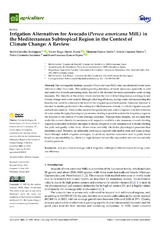Mostrar el registro sencillo del ítem
Irrigation alternatives for avocado (Persea Americana Mill.) in the Mediterranean Subtropical region in the context of climate change: a review
| dc.contributor.author | Cárceles Rodríguez, Belén | |
| dc.contributor.author | Durán Zuazo, Víctor Hugo | |
| dc.contributor.author | Franco Tarifa, Dionisio | |
| dc.contributor.author | Cuadros Tavira, S. | |
| dc.contributor.author | Cermeño Sacristan, Pedro | |
| dc.contributor.author | García-Tejero, Iván Francisco | |
| dc.date.accessioned | 2023-06-01T09:31:59Z | |
| dc.date.available | 2023-06-01T09:31:59Z | |
| dc.date.issued | 2023 | |
| dc.identifier.issn | 2077-0472 | |
| dc.identifier.uri | http://hdl.handle.net/10396/25441 | |
| dc.description.abstract | Due to congenital features, avocado (Persea Americana Mill.) trees are substantial water users relative to other fruit trees. The current growing deficiency of water resources, especially in arid and semi-arid avocado-producing areas, has led to the demand for more sustainable water-saving measures. The objective of this review was to analyze the role of deficit irrigation as a strategy to face climate change and water scarcity through achieving efficiency, saving water, and maximizing the benefits that could be achieved at the level of the irrigated agricultural system. Particular attention is devoted to studies performed in the subtropical Mediterranean climate, in which irrigated avocado orchards are common. These studies analyzed irrigation demand, deficit irrigation, and determination of water status through physiological parameters, leading to possible sustainable irrigation programs for avocado in the context of water shortage scenarios. Through these insights, we conclude that under the current climatic circumstances with respect to available water resources, avocado farming requires sustainable resilience strategies to reduce irrigation water consumption without affecting the yield and quality of the fruits. Water stress inevitably affects the physiological processes that determine yield. Therefore, an admissible yield loss is required with smaller fruits and water savings made through deficit irrigation strategies. In addition, modern consumers tend to prefer foods based on sustainability, i.e., there is a high demand for socially responsible and environmentally friendly products. | es_ES |
| dc.format.mimetype | application/pdf | es_ES |
| dc.language.iso | eng | es_ES |
| dc.publisher | MDPI | es_ES |
| dc.rights | https://creativecommons.org/licenses/by/4.0/ | es_ES |
| dc.source | Agriculture, 13(5), 1049 (2023) | es_ES |
| dc.subject | Avocado | en |
| dc.subject | Climate change | en |
| dc.subject | Deficit irrigation | en |
| dc.subject | Subtropical Mediterranean farming | en |
| dc.subject | Water use efficiency | en |
| dc.title | Irrigation alternatives for avocado (Persea Americana Mill.) in the Mediterranean Subtropical region in the context of climate change: a review | en |
| dc.type | info:eu-repo/semantics/article | es_ES |
| dc.relation.publisherversion | https://doi.org/10.3390/agriculture13051049 | es_ES |
| dc.rights.accessRights | info:eu-repo/semantics/openAccess | es_ES |

